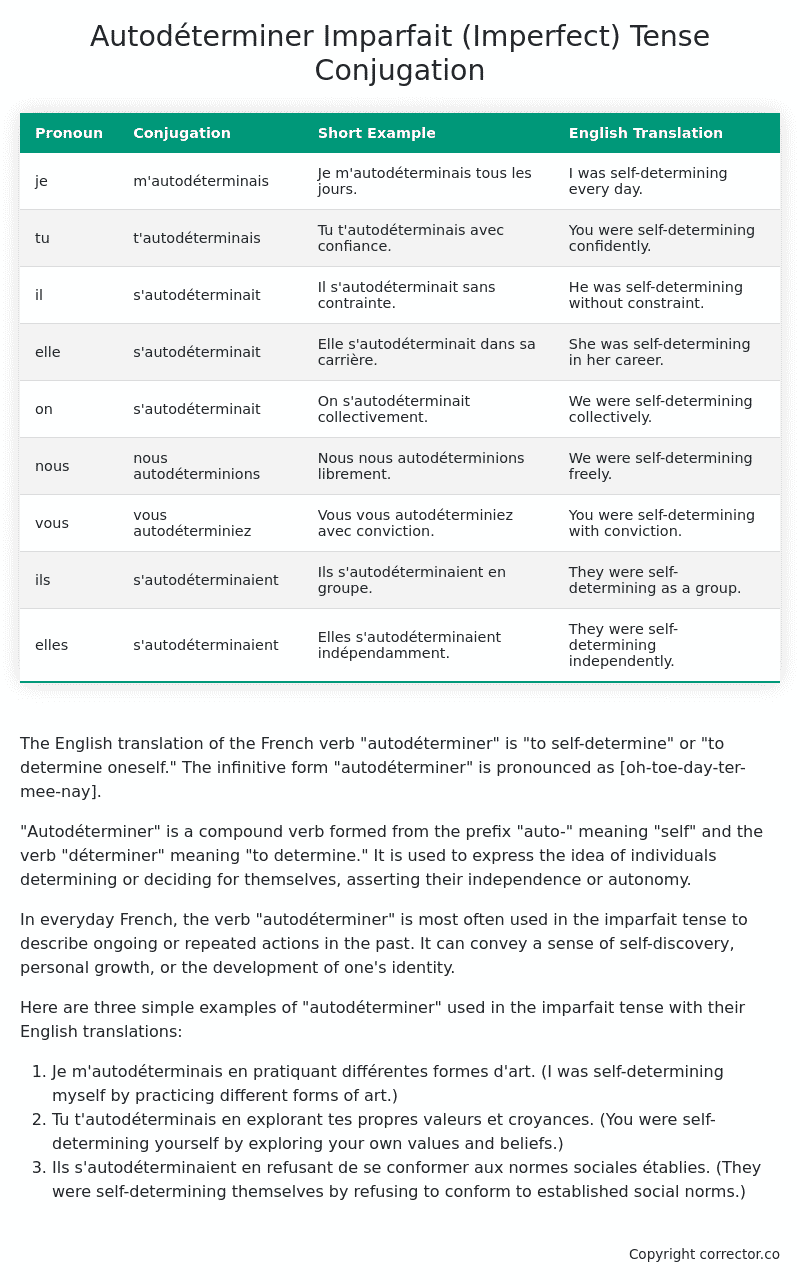Imparfait (Imperfect) Tense Conjugation of the French Verb autodéterminer
Introduction to the verb autodéterminer
The English translation of the French verb “autodéterminer” is “to self-determine” or “to determine oneself.” The infinitive form “autodéterminer” is pronounced as [oh-toe-day-ter-mee-nay].
“Autodéterminer” is a compound verb formed from the prefix “auto-” meaning “self” and the verb “déterminer” meaning “to determine.” It is used to express the idea of individuals determining or deciding for themselves, asserting their independence or autonomy.
In everyday French, the verb “autodéterminer” is most often used in the imparfait tense to describe ongoing or repeated actions in the past. It can convey a sense of self-discovery, personal growth, or the development of one’s identity.
Here are three simple examples of “autodéterminer” used in the imparfait tense with their English translations:
- Je m’autodéterminais en pratiquant différentes formes d’art.
(I was self-determining myself by practicing different forms of art.) - Tu t’autodéterminais en explorant tes propres valeurs et croyances.
(You were self-determining yourself by exploring your own values and beliefs.) - Ils s’autodéterminaient en refusant de se conformer aux normes sociales établies.
(They were self-determining themselves by refusing to conform to established social norms.)
Table of the Imparfait (Imperfect) Tense Conjugation of autodéterminer
| Pronoun | Conjugation | Short Example | English Translation |
|---|---|---|---|
| je | m’autodéterminais | Je m’autodéterminais tous les jours. | I was self-determining every day. |
| tu | t’autodéterminais | Tu t’autodéterminais avec confiance. | You were self-determining confidently. |
| il | s’autodéterminait | Il s’autodéterminait sans contrainte. | He was self-determining without constraint. |
| elle | s’autodéterminait | Elle s’autodéterminait dans sa carrière. | She was self-determining in her career. |
| on | s’autodéterminait | On s’autodéterminait collectivement. | We were self-determining collectively. |
| nous | nous autodéterminions | Nous nous autodéterminions librement. | We were self-determining freely. |
| vous | vous autodéterminiez | Vous vous autodéterminiez avec conviction. | You were self-determining with conviction. |
| ils | s’autodéterminaient | Ils s’autodéterminaient en groupe. | They were self-determining as a group. |
| elles | s’autodéterminaient | Elles s’autodéterminaient indépendamment. | They were self-determining independently. |
Other Conjugations for Autodéterminer.
Le Present (Present Tense) Conjugation of the French Verb autodéterminer
Imparfait (Imperfect) Tense Conjugation of the French Verb autodéterminer (You’re reading it right now!)
Passé Simple (Simple Past) Tense Conjugation of the French Verb autodéterminer
Passé Composé (Present Perfect) Tense Conjugation of the French Verb autodéterminer
Futur Simple (Simple Future) Tense Conjugation of the French Verb autodéterminer
Futur Proche (Near Future) Tense Conjugation of the French Verb autodéterminer
Plus-que-parfait (Pluperfect) Tense Conjugation of the French Verb autodéterminer
Passé Antérieur (Past Anterior) Tense Conjugation of the French Verb autodéterminer
Futur Antérieur (Future Anterior) Tense Conjugation of the French Verb autodéterminer
Subjonctif Présent (Subjunctive Present) Tense Conjugation of the French Verb autodéterminer
Subjonctif Passé (Subjunctive Past) Tense Conjugation of the French Verb autodéterminer
Subjonctif Imparfait (Subjunctive Imperfect) Tense Conjugation of the French Verb autodéterminer
Conditionnel Présent (Conditional Present) Tense Conjugation of the French Verb autodéterminer
Conditionnel Passé (Conditional Past) Tense Conjugation of the French Verb autodéterminer
Conditionnel Passé II (Conditional Past II) Tense Conjugation of the French Verb autodéterminer
L’impératif Présent (Imperative Present) Tense Conjugation of the French Verb autodéterminer
L’impératif Passé (Imperative Past) Tense Conjugation of the French Verb autodéterminer
L’infinitif Présent (Infinitive Present) Tense Conjugation of the French Verb autodéterminer
L’infinitif Passé (Infinitive Past) Tense Conjugation of the French Verb autodéterminer
Le Participe Présent (Present Participle) Tense Conjugation of the French Verb autodéterminer
Le Participe Passé (Past Participle) Tense Conjugation of the French Verb autodéterminer
Struggling with French verbs or the language in general? Why not use our free French Grammar Checker – no registration required!
Get a FREE Download Study Sheet of this Conjugation 🔥
Simply right click the image below, click “save image” and get your free reference for the autodéterminer imparfait tense conjugation!

Autodéterminer – About the French Imparfait Tense
NOTE: To take a deep dive into all the French tenses then see our article on Mastering French Tense Conjugation.
Formation of the Imparfait Tense
For regular -er verbs:
For regular -ir verbs
For regular -re verbs
Common Everyday Usage Patterns
Description of Past Habits
Background Information
Mental and Emotional States
It’s employed to express emotions, thoughts, or physical sensations in the past. For example: “J’étais content quand il est arrivé.” (I was happy when he arrived.)
Ongoing Actions
Points to Note About the Imparfait Tense
Passé Composé vs. Imparfait
Conditional
Si Clauses
Narration
I hope you enjoyed this article on the verb autodéterminer. Still in a learning mood? Check out another TOTALLY random French verb imparfait conjugation!


